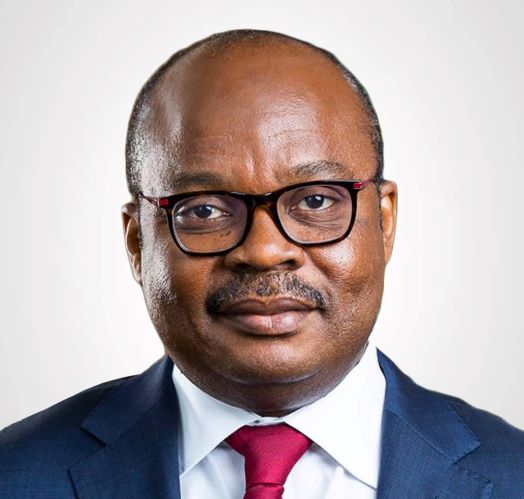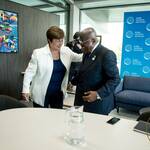Governor of the Bank of Ghana (BoG) and Chairman of the Monetary Policy Committee (MPC), Dr Ernest Addison has underscored the need for a swift conclusion of discussions with the International Monetary Fund (IMF) to restore economic stability.
Addressing journalists at a press briefing in Accra yesterday, Dr Addison said “the Committee assesses that the engagement with IMF has been positive and early conclusion of the programme discussions will help re-anchor stability.”
According to the Governor, an agreed programme with the Fund was critical because while government’s expenditures had been broadly on target, revenue performance had been below expectations, complicating fiscal policy implementation.
Financing of the budget
Dr Addison said “financing of the budget so far has predominantly been from the banking sector with the central bank absorbing a larger share.
Portfolio reversals by non-resident investors
Persistent uncovered auctions and portfolio reversals by non-resident investors continue to pose risks to financing of the budget, resulting in monetisation of the budget deficit by the central bank.”
“The MPC recognizes the fact that the current condition is sub-optimal and will be interim until agreements are reached on an IMF-supported programme,” the Governor noted.
250 basis points prime rate increase
Dr. Addison who announced an increase in the Monetary Policy Rate by 250 basis points to 24.5% said persisting inflationary pressures coupled with the downward-looking cedi had occasioned a further tightening of monetary policy.
The Committee cited heightened economic and policy uncertainties, inflationary pressures, and weakening of the Cedi against the US Dollar as among the reasons for the increment.
Inflation remains elevated, and the balance of risks is on the upside. Although the forecasts are for monthly inflation to continue to slow down, the risks are on the upside, emanating largely from pass-through effects of the currency depreciation, the recent upward adjustment in utility tariffs, and rising inflation expectations.
This was in spite of the fact that the outlook for the Ghana Cedi had improved, aided by the recent disbursement of the loan from Afreximbank of $750 million, the signing of the syndicated Cocoa Loan of $1.13 billion, and the agreement with gold and oil companies to purchase the repatriated foreign exchange earnings of about $83.9 million.
Gross International Reserves declines to $6.6bn (2.9 months of import cover)
The BoG Governor disclosed that the stock of Gross International Reserves declined to $6.6 billion, equivalent to 2.9 months of import cover for goods and services in September 2022.
That, he indicated compared with the December 2021 position of $9.7 billion, equivalent to 4.3 months of import cover.
$2.7 billion Net International Reserves
Net International Reserves, which excludes encumbered assets and petroleum funds, is estimated at $2.7 billion as at September 2022.
Revenue performance below expectations
On the fiscal situation, the BoG said while expenditures had been broadly on target, revenue performance had been below expectations, complicating fiscal policy implementation.
It said financing of the budget so far had predominantly been from the banking sector with the central bank absorbing a larger share.
Ghana’s main export commodities saw mixed developments on the international markets. The strong rally in Brent crude oil prices since the start of 2022 slowed somewhat to settle at $97.74 per barrel, representing a 30.7 year to date gain on the back of global recession concerns.
“On cocoa, prices eased to $2,385.96 per tonne, representing a contraction of 3.9% on year-to-date basis.
“Gold price also fell by 1.5% to settle at $1,763.71 per fine ounce due to higher bond yields and a strong US dollar, as the US Fed reaffirmed its commitment to bring inflation under control,” Dr Addison explained.
- Empowering ECG, NEDCO in electricity supply without privatization - 11 April 2025
- Friday, April 11, 2025 Newspaper Headlines - 11 April 2025
- MTN unveils yearlong strategy to transform SMEs - 10 April 2025




